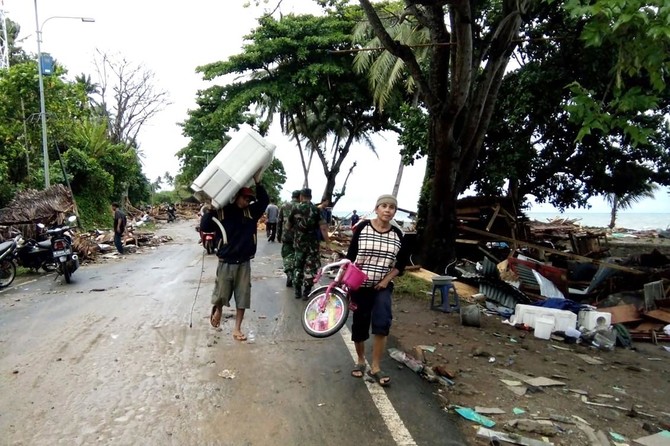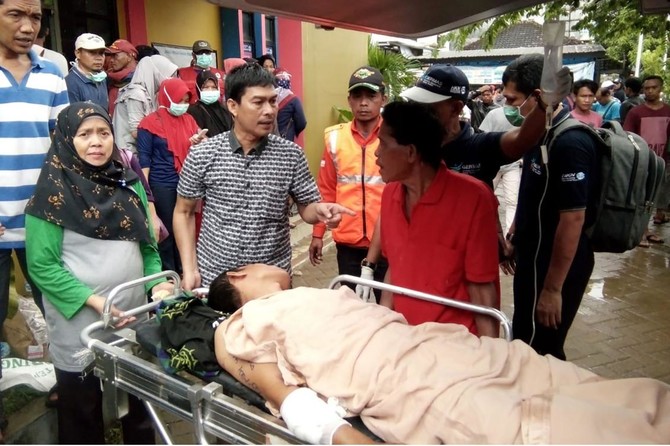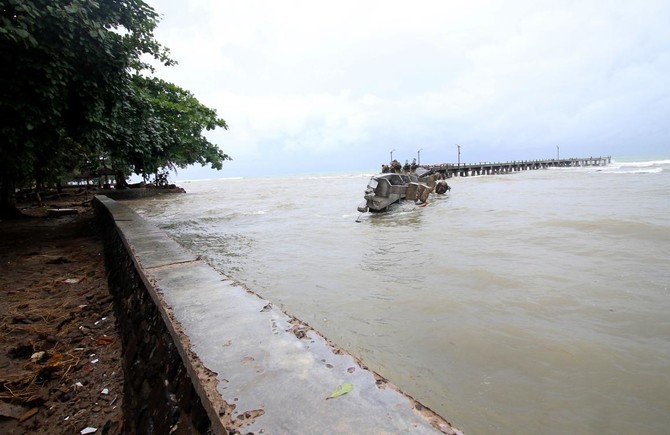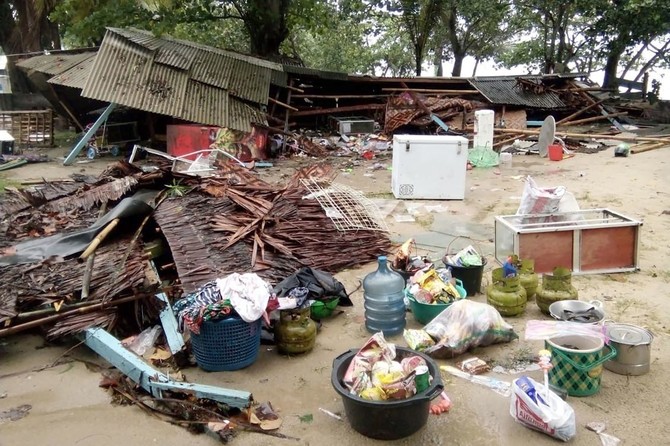JAKARTA: An unpredictable chain of events and an inadequate early warning system combined to deadly effect with the tsunami that slammed into coastal areas of Indonesia killing nearly 300 people, disaster officials and experts said Monday.
The killer wave struck tourist beaches and low-lying settlements on both sides of the Sunda Strait with devastating force on Saturday night, catching both residents and disaster monitors totally unawares.
In a series of tweets later deleted with a stricken apology, the national disaster agency had stated there was “no tsunami threat” even as the wave crashed over parts of southern Sumatra and the western tip of Java.
“The lack of an early warning system is why the tsunami was not detected,” acknowledged disaster agency spokesman Sutopo Purwo Nugroho.
“Signs that a tsunami was coming weren’t detected and so people did not have time to evacuate,” he added.
Indonesia is one of the most disaster-prone nations on Earth due to its position straddling the so-called Pacific Ring of Fire, where tectonic plates collide.
A quake-tsunami that struck Palu on Sulawesi island in September killed around 2,200 people, with thousands more missing and presumed dead.
Tide-monitoring stations and data-modelling are the main tools Indonesia monitoring agencies use to predict tsunamis — usually in the wake of an earthquake.
But even if all the country’s stations are working, the network is recognized to be limited and in any case gives people little time to flee as they only detect waves once they are close to shore.
Efforts to improve systems have been beset by problems, from a failure to properly maintain new equipment to bureaucratic bickering.
Experts say Saturday’s disaster was most likely caused by a moderate eruption of the Anak Krakatoa volcano in the Sunda Strait that triggered either a large and very fast moving flow of molten rock into the sea or a sudden and massive submarine landslide.
In either case, large volumes of water would have been displaced, resulting in a tsunami.
“Such triggers would not have been detected by Indonesia’s tsunami early warning system because that is geared-up to detect earthquake-triggered tsunamis,” said Richard Teeuw, a disaster risk reduction expert at the University of Portsmouth in England.
“The night-time occurrence of the tsunami would have added to the chaos, with little chance of seeing the incoming tsunami wave and running to safety,” Teeuw said.
And the fact that Anak Krakatoa had been displaying significant activity for months, meant that Saturday’s minor eruption would have sparked no particular cause for alarm.
After the catastrophic Indian Ocean quake-tsunami in 2004, Indonesia deployed a number of early-warning marine buoys to detect tsunamis, but Nugroho said they had been out of action for the past six years.
“Vandalism, limited budgets and technical issues are the reasons why we currently don’t have tsunami buoys,” he said. “We must rebuild them to strengthen Indonesia’s Tsunami Early Warning System.”
Such buoys are normally deployed along underwater tectonic plate boundaries — the focus again on detecting earthquake-generated tsunamis rather than those triggered by volcanic activity.
David Rothery, a professor of planetary geosciences at Britain’s Open University, noted that a blanket deployment of buoys would still have a limited warning impact if the tsunami was generated close to the shore.
“Even if there had been such a buoy right next to Anak Krakatau, this is so close to the affected shorelines that warning time would have been minimal given the high speeds at which tsunami waves travel,” Rothery said.
No warning meant no escape from Indonesia tsunami
No warning meant no escape from Indonesia tsunami

- “The lack of an early warning system is why the tsunami was not detected,” acknowledged disaster agency spokesman Sutopo Purwo Nugroho
- Indonesia is one of the most disaster-prone nations on Earth due to its position straddling the so-called Pacific Ring of Fire, where tectonic plates collide
Zelensky expresses hopes US, Europe will be involved in Ukraine peace talks

KYIV: Ukrainian President Volodymyr Zelensky hopes Europe and the United States will be involved in any talks about ending his country’s war with Russia, he told reporters on Saturday.
At a joint news conference with Moldovan President Maia Sandu, Zelensky said Ukraine also needed to be involved in any talks about ending the war for such negotiations to have any meaningful impact.
Ukrainian hit on occupied southern village kills 3: Moscow-installed official

- “Ukrainian terrorists shelled Oleshky with cluster munitions and remote mine-clearing systems,” Saldo said
- “At the moment, we know about three killed civilians”
MOSCOW: Russian occupational authorities in southern Ukraine said Saturday that a Ukrainian strike on a Moscow-held village in the Kherson region killed three people.
Vladimir Saldo, the Moscow-installed leader of the Russian-occupied part of Ukraine’s Kherson region, accused Kyiv of using cluster munitions in a strike on the village of Oleshky.
Oleshky lies close to the city of Kherson and near the Dnipro river, which forms the frontline in southern Ukraine.
“Ukrainian terrorists shelled Oleshky with cluster munitions and remote mine-clearing systems,” Saldo said in a post on Telegram.
“At the moment, we know about three killed civilians,” he added, saying the victims are being identified.
He called on villagers to stay in their homes or in shelters.
Both sides in the almost three-year war have accused each other of using cluster munitions.
The US has supplied cluster munitions — which rights groups say are particularly deadly and have long-term effects — drawing criticism even from its allies.
Kyiv, meanwhile, said that four people were wounded by Russian attacks in the Kherson region on Saturday.
Seoul court rejects second request to extend Yoon detention

- Yoon Suk Yeol was arrested last week on insurrection charges
- Becomes first sitting South Korean head of state to be detained in a criminal probe
SEOUL: A Seoul court rejected a second request Saturday to extend the detention of impeached President Yoon Suk Yeol over his failed attempt to declare martial law, putting pressure on prosecutors to quickly indict him.
Yoon was arrested last week on insurrection charges, becoming the first sitting South Korean head of state to be detained in a criminal probe.
His December 3 martial law decree only lasted about six hours before it was voted down by lawmakers, but it still managed to plunge South Korea into its worst political crisis in decades.
The Seoul Central District Court on Saturday turned down a request for a detention extension, prosecutors said in a brief statement.
This follows a ruling by the same court a day earlier when a judge stated it was “difficult to find sufficient grounds” to grant an extension.
Prosecutors had planned to keep the disgraced leader in custody until February 6 for questioning before formally indicting him, but that plan will now need to be adjusted.
“With the court’s rejection of the extension, prosecutors must now work quickly to formally indict Yoon to keep him behind bars,” Yoo Jung-hoon, an attorney and political commentator, said.
Yoon has refused to cooperate with the criminal probe, with his legal defense team arguing investigators lack legal authority.
The suspended president is also facing a separate hearing in the Constitutional Court which, if it upholds his impeachment, would officially remove him from office.
An election would then have to be held within 60 days.
Kabul residents name their newest mosque after Gaza

- Gaza Mosque is located in Qua-ye-Markaz, near Kabul’s famous carpet market
- Opened this month, the two-story mosque was funded from public donations
KABUL: In an act of solidarity and to honor the victims of Israel’s war on Gaza, residents of the Afghan capital have named their newest mosque after the Palestinian enclave.
Opened on Jan. 11, the Gaza Mosque is located in the Qua-ye-Markaz area of Kabul, close to business plazas and the city’s famous carpet market.
A two-story building, which can accommodate some 500 worshippers, it was funded from public donations on land provided by the Kabul municipality.
“The mosque was named Gaza Mosque to acknowledge the struggle and sacrifices of the men, women, children, youth and elders in Gaza in defending their land,” Hajji Habibudin Rezayi, a businessman who led the fundraising, told Arab News.
“There were a few name suggestions before the completion of the mosque’s construction, including Palestine, Aqsa and Gaza. Most of the campaign participants voted for Gaza as a symbol of solidarity.”
There is widespread support for Palestine among Afghans — many of whom know what it means to live under foreign occupation as they endured it during the 1979-1989 Soviet-Afghan War and the 20 years of war following the US invasion in 2001.
Afghanistan was the first non-Arab country to recognize the Palestinian National Council’s declaration of independence in 1948. Every successive Afghan government has stood by Palestine in the wake of Israel’s wars against it and the occupation of Palestinian land.
Since the beginning of Israel’s latest deadly assault on Gaza in October 2023, which has destroyed most of the enclave’s civilian infrastructure and killed tens of thousands of civilians, imams at Afghan mosques have regularly held special prayers for Palestinian freedom.
When a ceasefire was announced last week, celebrations were organized both in Afghan households and in public spaces.
“Afghans have been trying to help as much as they can to send support to Palestinians in terms of donations, prayers and other acts of solidarity,” said Abduraqib Hakimi, the imam of the Gaza Mosque.
“Every Muslim and human must have some solidarity with the people of Palestine and Gaza for what they have gone through during the past year and a half.”
Worshipers at the mosque told Arab News that they hoped that their country could do more.
“Israel’s actions in Palestine are nothing but genocide,” one of them, Asadullah Dayi, said.
“Innocent women and children were killed, and houses were destroyed. There has never been so much oppression in the history of Islam like the Zionist oppression of the Palestinians.”
Three years after restoring ties, Thailand sees growth in exchanges with Saudi Arabia

- Last week, Saudi FM led Kingdom’s delegation at inaugural meeting of Saudi-Thai Coordination Council
- With increase in trade relations, Thai Board of Investment opened an office in Riyadh in July last year
Bangkok: Three years into the reestablishment of ties with Saudi Arabia, Thais say that they are observing new opportunities and the growth of relations.
Relations between Saudi Arabia and Thailand were officially restored in January 2022, during Thailand’s former prime minister Prayut Chan-o-cha’s visit to Riyadh, when the two countries agreed to appoint ambassadors for the first time in more than three decades.
The visit was reciprocated in November that year, when Saudi Crown Prince Mohammed bin Salman arrived in Bangkok as a guest of honor at the Asia-Pacific Economic Cooperation summit and became the first Saudi official to make such a trip.
Many agreements and official exchanges have since followed. Not only the volume of trade between the two countries has significantly increased, but also people-to-people exchanges and political consultations.
The ties were further solidified last week, when Saudi Foreign Minister Prince Faisal bin Farhan visited Thailand, leading the Kingdom’s delegation at the inaugural meeting of the Saudi-Thai Coordination Council. The meeting drove further bilateral cooperation in politics, consular affairs, security and military ties, culture, tourism, economy and trade.
Alhuda Chanitphattana, a Middle East expert from Bangkok University, told Arab News that while over the past three years there has been significant growth in various industries, especially tourism and cooperation between small and medium-sized enterprises, last week’s visit marked another milestone in relations.
“The Jan. 16 meeting was a hopeful step in the history of our ties,” she said.
“The Saudi foreign minister was here himself, bringing along the press, and the meeting was able to set up a number of significant collaborations.”
The Tourism Authority of Thailand estimated that since the restoration of ties, the number of Saudis visiting the Southeast Asian nation has risen threefold, as it expected 300,000 Saudi travelers in 2025.
Since the resumption of diplomatic relations in 2022, bilateral trade has grown by more than 30 percent, surpassing $7 billion. Key Thai exports include automobiles, wood products and canned seafood, while Saudi Arabia primarily exports crude oil, chemicals and fertilizers to Thailand.
The upside is seen especially in the automobile sector.
“Thailand’s car and car parts export to Saudi Arabia grew by 40-50 percent in the past year due to more demand in the Kingdom,” Chanitphattana said. “Thai mechanics are in high demand now.”
The establishment of a Thailand Board of Investment office in Riyadh in July 2024 has also underscored the country’s commitment to supporting Saudi Vision 2030 and attracting investors from the Kingdom.
“There was a Thai exporter of essential oils who was earlier based in Dubai, but after 2022, he moved to Riyadh and opened an office in King Abdullah Financial District,” Chanitphattana said, adding that the Thai Chamber of Commerce is open to helping other businesses match with Saudi counterparts.
One such entrepreneur is Manoj Atmaramani, who in 2022 was among the first Thais to join a hotel, restaurant and cafe/catering event in Saudi Arabia.
That visit bore fruit. Today, Atmaramani exports tea and coffee products to the Kingdom and his business is growing.
“Now Saudi people can travel here, and Thai people can travel there. I have taken many Saudi businesspeople to my factory. I have also visited coffee factories in Saudi Arabia. I would advise the Thai businesspeople to present themselves at the business exhibitions in Saudi Arabia,” he said.
“Saudi Arabia is my first export market outside of Southeast Asia. My product lines have expanded since.”























